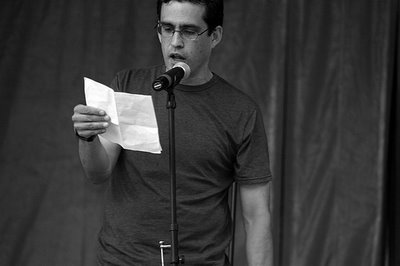Special contribution by American poet Rodrigo Toscano (Collapsible Poetics Theater, NYC).
In nY #9, Samuel Vriezen published his Dutch version of Toscano’s theatrical poem “Pig Angels Of The Americlypse”.

“Lucid dreaming” refers to a dream state in which one is aware that one is dreaming. In some instances, a person might try to, and actually achieve an influence on the outcome of such dreaming. Scenarios might be fashioned into desired results by the dreamer. Additionally, one might be able to “speak” to an entity that appears in the dream in the following manner: “You’re not real, you don’t exist.” The entity’s presence meanwhile (whether it acknowledges one’s definitions or not) has the curious ability to persist in its own right. Paradoxically, the entity has simply “appeared” in the dream as from out of nowhere. So much for “lucidity,” so much for “control” over an outcome steaming from one’s “conscious will” to shape a <sub> “reality” / dream.
A more complex form of lucid dreaming is one in which one “awakes” from a dream onto another <sub> “reality.” At this point in “wakefulness,” one experiences a very brief moment of believing that one has finally awakened from dreaming altogether. The very room where one is sleeping might (again, as “out of nowhere”) appear with no distortion or phantasmagoria of any kind. One says to oneself: “Phew! That was weird, what a journey that was! But here I am now – back.” This sensation (or sensationalist state of being), this “I’m back” feeling at first reassures, calms. But soon, one notices that nothing else “happens” in this familiar place, the only thing that “happens” is an endless echoing of “I’m back.” A suspicion like a spark then flickers, then an infinitesimally short moment of silence in utter dark follows, afterwards — a flood — of doubt, disorientation, confusion, anxiety, and ultimately, paralysis sets in. One is drowning in “familiar settings.”
At last, this thunderously dissonant torrent that’s tearing up all elements of reality from their placements and sending them broken and crashing — fast — to nowhere, culminates in “awakening,” or rather collapsing onto yet another <sub> “reality,” one with its own “back at last” moment waiting in store. And so on, and so on.
This … is what it feels like to (and the word is laughable) “co-exist” with Nationalist American “consciousness.” “Lucidities r us” — is what these consciousnessessessess might call themselves, that is, if they were themselves able to “awaken” long enough do it.
“Erwach!” “Despierten!” “Wakker worden!” “Réveillez-vous!” “Awake!” — all stock, standard, minimalist, rightist-nationalist slogans.
“I don’t exist” … can we calmly and coolly utter that … before being told “we do”? What’s the opposite of a lucid dream? What is the reverse direction, or wholly divergent pattern of movement from this I’m-back-ness? One: “I’m not coming back.” Two: “I was never there.” These two, combined, is sodium pentothal injected into the Hippocampus of Fascist Nationalism. “I’m not coming back, besides, I was never there.”
And this, “I don’t exist” way of taking a stand, or rather moving (same, upon close inspection) is not a naïve embrace of civic nullity, nor is it an apologia for ignorance of political power.
This is to say that wandering among symbolic accidents — is essential to revolution. Or more elementally put: “Don’t wake me up just yet, I’m dreaming!”
◊
Rightist Reactivity = “lucidity”, an obsession with control and “reality”
Centrist Paraplegia = somnolence, inability to be ok with restful dreaming
Oppositionalist Revolutionary Potential = dreaming, repeated revisiting of the symbolic orders of things — comprehension and projection
Right now, in the U.S., we’ve been swinging from “lucidity” to “somnolence” and back, over and over. Both entail a disturbance of dreaming. The former with an overestimation of the self’s power, the latter tending towards no knowledge at all of one’s power to shape reality.
Only through dreaming of transformative power does power of transformation come. The simple ability to un-“knowingly” (un-authoritatively) rearrange the room from an “as it is” state to a “what it’s been” state, does the house — the neighborhood — the region, achieve rest, revival. Dreaming relieves us of an endless stream of “new <collapsing> realities.” Only after deep dreaming can we more accurately (strategically, tactically) awaken into a non-dream state.
In a non-dream state, the nose, the eyes, the mouth, the hands, gain the ability to ride the swiftness of new desires newly sensed, explored, plumbed, and eventually, elevated to story.
Rodrigo Toscano
Spring, 2011
Read more
– The EPC @ SUNY Buffalo on Rodrigo Toscano (texts, pics, recordings, videos and reviews)
– Nathalie Knight’s review of Toscano’s Collapsible Poetics Theater in Jacket #38